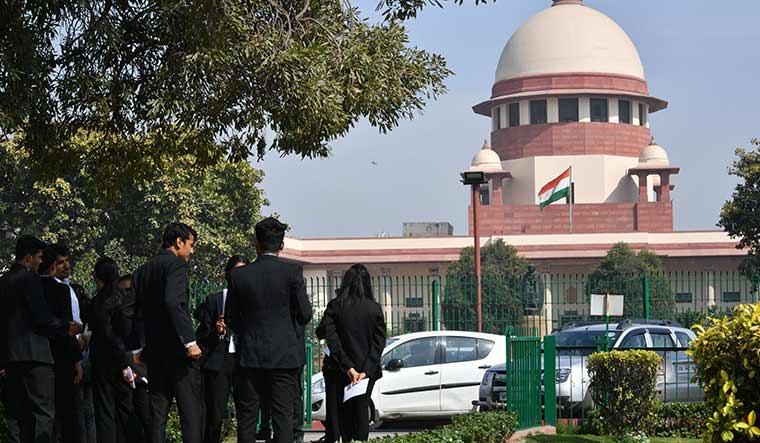The Supreme Court on Tuesday deferred till July 11 the hearing on a batch of pleas challenging the remission granted last year to all the 11 convicts in the case of gang rape of Bilkis Bano and the murder of her family members during the 2002 post-Godhra riots.
A bench of justices K.M. Joseph, B.V. Nagarathna and Ahsanuddin Amanullah directed the issuance of notices to the convicts, who remained unserved even now.
The bench also directed the publication of notices in local newspapers, including in Gujarati and English, against the convicts who could not be served notices, including one whose house was found by the local police to be locked and his phone was switched off.
It directed that the next date of hearing of the matter - July 11 - shall also be published in the notices to be carried in the newspapers. "We are adopting this process so that time is not wasted on the next date of hearing of the matter and the matter could proceed," the bench said.
On July 11, a new bench is likely to hear the matter as Justice Joseph, who is heading the bench is set to superannuate on June 16, with May 19 being his last working day. The Supreme Court will go on summer vacation from May 20 till July 2.
On May 2, the top court deferred the hearing after some of the counsel for the convicts raised objections about not being served notices on the pleas.
The top court had then observed, "It is obvious, rather more than obvious, that you all (convicts) do not want the hearing to be conducted by this bench."
The Centre and the Gujarat government had told the court that they are not claiming any privilege and not filing any plea for a review of the court's March 27 order, asking for the production of the original records with regard to the remission granted to the convicts.
The Gujarat government had raised preliminary objections with regard to the petitions filed in the matter other than the one by Bano, saying it will have wide ramifications as every now and then, third parties will approach courts in criminal cases.
On April 18, the top court questioned the Gujarat government over the remission granted to the 11 convicts, saying the gravity of the offence should have been considered, and wondered if there was any application of mind.
Asking for the reasons for the premature release of the convicts, the top court had also questioned the parole granted to them during their incarceration period. "It(remission) is a kind of grace, which should be proportional to the crime," it had said.
The Centre and the Gujarat government had then told the court that they might file a plea seeking a review of its March 27 order, asking them to be ready with the original files on the grant of remission.
On March 27, terming Bilkis Bano's gang rape and the murder of her family members during the 2002 post-Godhra riots a "horrendous" act, the apex court had asked the Gujarat government whether uniform standards, as followed in other murder cases, were applied while granting remission to the 11 convicts.
It had sought the responses of the Centre, the Gujarat government and others on the plea filed by Bano, who has challenged the remission of the sentences. All 11 convicts were granted remission by the Gujarat government and released on August 15 last year.
PILs were filed by CPI(M) leader Subhashini Ali, independent journalist Revati Laul, former vice-chancellor of the Lucknow University Roop Rekha Verma and Trinamool Congress (TMC) MP Mahua Moitra against the release of the convicts.
Bano was 21 years old and five months pregnant when she was gangraped while fleeing from the riots that broke out after the Godhra train-burning incident. Her three-year-old daughter was among seven family members killed in the riots.


